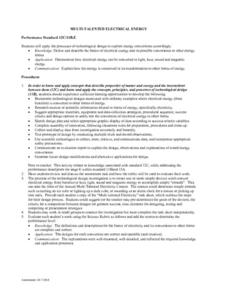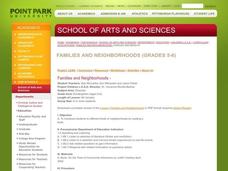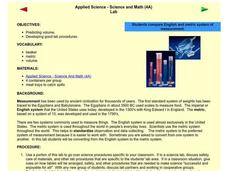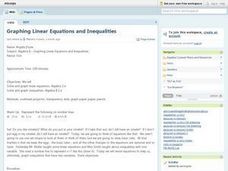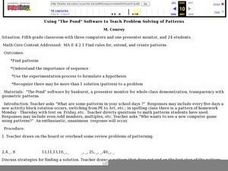Curated OER
The Meaning of Food
Students gain an understanding of the many roles that food plays in people's lives. They explore about different cultures and groups through food. Students use a range of research and presentation skills.
Curated OER
Doing Science Safely
Students are introduced to how to practice science experiments safely outside of school. In groups, they create a poster showing the safety guidelines and responses to specific situations should they occur. They also practice using...
Curated OER
Quest for Freedom
Fourth graders examine and discuss the Texas Revolution and the founding of Texas as a Republic. They read about the major events of the Revolution, research the events online, and complete a chart to present to the class.
Curated OER
Apply Scientific Inquiry and Scientific Habits of Mind
Students review the components of the scientific inquiry method. In groups, they apply this method to various experiments they are given to complete. They also use the correct scientific habits of mind when researching different concepts.
Curated OER
Algebra Jeopardy
Students participate in an algebra jeopardy game. In this algebra review lesson, students are split into two groups and answer review questions from the Algebra I curriculum. Students use a prepared computer game as a game board.
Curated OER
Multi-Talented Electrical Energy
Students explore energy conversions by demonstrating the conversion of electrical energy into light, heat, sound, and magnetic energy. Students create a simple device that converts electrical energy from batteries to heat, light, sound...
Curated OER
A Little Kandinsky For All
Learners create abstract compositions based on the later works of Wassily Kandinsky using the primary colors in this early elementary Art lesson. The lesson emphasizes the use of color, lines, and shapes to create the abstract works of...
Curated OER
Families and Neighborhoods
Students answer questions about families and what they do together. Students discuss different types of families and draw a picture of their family, discussing similarities and differences in the pictures and in families in general.
Curated OER
Readers as Individuals
Sixth graders set and are encouraged to meet their reading goals and demonstrate knowledge of literary elements in this lesson.
Curated OER
Types of Triangles
Learners classify triangles by the length of their sides. In this geometry lesson, students use a white board to demonstrate the angles of various triangles. Learners construct an equilateral, isosceles, and a scalene triangle.
Curated OER
Families and Neighborhoods
Students create a poster representative of their community. In this lesson on the world around them, students learn about their neighborhood. After they have gathered some knowledge about the objects and people in their community,...
Curated OER
Pirate Etiquette
Young scholars conduct research into the lives of pirates and create a personal skit based upon the research as inspiration. The use of imagination is a key component to the type of writing to be done during the class.
Curated OER
Property Posters
Students identity properties of addition and multiplication. For this addition and subtraction properties lesson, students explore commutative, associative, and distributive properties as they design posters that feature the properties...
Curated OER
Applied Science - Science and Math Lab
Although it was written to use in a science class, this measurement lesson is adaptable to Common Core standards in math for measurement and data. Youngsters are introduced to two types of measurement systems. They use both the English...
Curated OER
Graphing Linear Equations and Inequalities
Students discuss methods to solve equations and inequalities with one variable. As a review, they write Addition and Subtraction properties of equality and Multiplication and Division properties of equality. Students graph points, write...
Curated OER
Respect for Authority
High schoolers develop cross-cultural understanding. In this democracy lesson, students discuss core democratic values as they examine the governance in their school and their local community. High schoolers also discuss the...
Curated OER
Getting In Is Half the Battle
Students read and discuss "Defending Affirmative Action With Social Science," examining the admissions policies in public universities and colleges. They write persuasive essays either for or against the admissions policies in their state.
Curated OER
The History of Paper Money
Pupils research the history of paper money using the Internet in order to answer questions and create their own bills.
Curated OER
Mock Congress
High schoolers simulate the legislative process of law-making by assuming different roles. They investigate the process by writing a bill on any subject of his/her own choice
Curated OER
I Wonder Why There Is So Much Frass...
Students examine frass and try to determine what it is. They make observations and add to their growth charts on a daily basis. They make predictions and support them to end the lesson.
Curated OER
Cooperative Activities
Three activities can foster communication in your class. The first activity must be done non-verbally. The second takes a bit of team work, planning, and cooperation. Finally, the third activity is built around listening and trust. Get...
Curated OER
Problem Solving of Patterns
Fifth graders use a software program to practice their problem solving skills. As a class, they identify patterns in their days at school and review problem solving patterns in math. They solve different problems and discover that the...
Curated OER
Counting on Frank
Eighth graders read a book "Counting on Frank" with a partner. Using the text, they identify eight clues and use their mathematical reasoning in real-life situations. They participate in a game and turn in a notebook in which they write...
Curated OER
Writing Strategies
Young writers complete a unit of activities to learn and use writing strategies. They will complete 8 activities to prewrite, use descriptive words, asking and telling sentences, and correct spelling within their writing. Then they watch...







